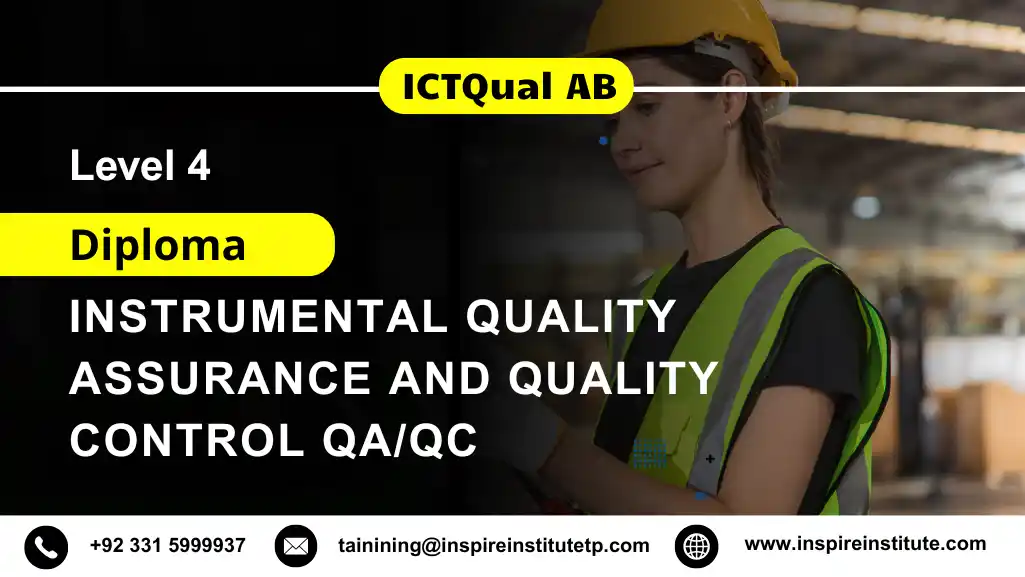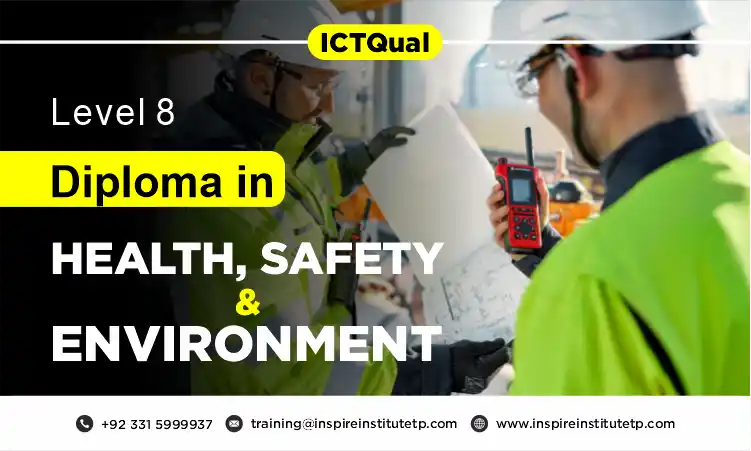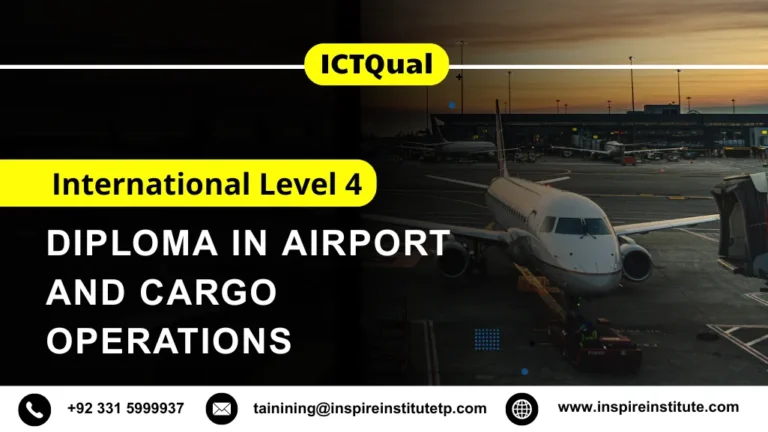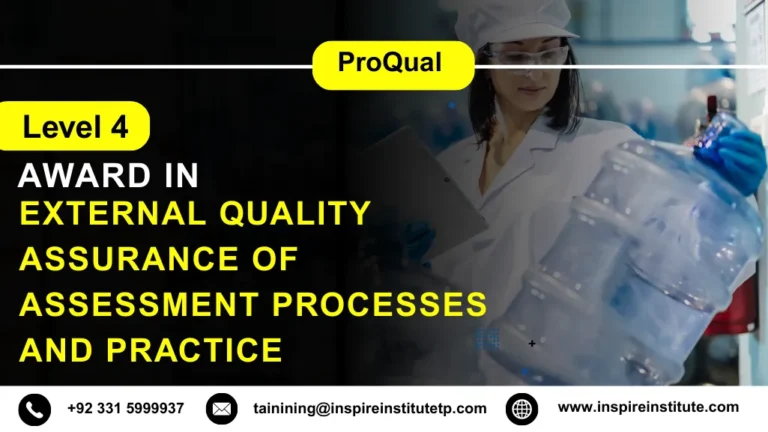ICTQual AB Level 4 Diploma in Instrumental Quality Assurance and Quality Control QA/QC
The ICTQual AB Level 4 Diploma in Instrumental Quality Assurance and Quality Control (QA/QC) is an advanced qualification designed for professionals who aim to deepen their technical expertise in instrumentation, inspection, and industrial quality management. As industries evolve toward greater precision and automation, the demand for skilled QA/QC specialists with strong analytical and instrumental knowledge continues to rise. This diploma Quality Assurance provides a comprehensive understanding of advanced quality assurance systems, instrumental analysis, and control methodologies essential for ensuring product reliability, safety, and compliance across technical sectors.
The purpose of the ICTQual AB Level 4 Diploma in Instrumental QA/QC is to build upon foundational QA/QC knowledge, introducing learners to advanced quality management techniques, inspection procedures, and instrumentation standards used in global industries. It equips professionals with the ability to develop, implement, and monitor quality control frameworks that align with international standards such as ISO 9001, ISO 17025, and other key industrial quality systems. Learners also gain an in-depth understanding of calibration, process validation, and performance measurement in diverse industrial applications.
Through this qualification, learners will develop high-level technical skills in instrumental quality assurance and quality control, including the calibration of complex systems, advanced data analysis, and quality auditing. The program emphasizes practical application, enabling participants to apply theoretical principles to real-world industrial operations. By mastering these competencies, learners will be capable of leading QA/QC projects, performing detailed inspections, and ensuring compliance with strict quality benchmarks.
The ICTQual AB Level 4 Diploma in Instrumental QA/QC also strengthens problem-solving and decision-making abilities crucial for managing quality control teams and implementing continuous improvement initiatives. Learners will explore root cause analysis, risk-based thinking, and corrective action planning—essential skills for maintaining operational excellence and supporting sustainable industrial growth.
Why Choose this Qualification
The ICTQual AB Level 4 Diploma in Instrumental Quality Assurance and Quality Control (QA/QC) is a highly valued qualification designed for professionals who aspire to advance their careers in the field of industrial quality management and instrumentation. This diploma Quality Assurance offers a unique blend of theoretical understanding and practical expertise, enabling learners to master advanced QA/QC systems, inspection methodologies, and international quality standards. It is ideal for individuals seeking to enhance their technical competence, improve their professional standing, and contribute effectively to maintaining and improving product and process quality within industrial sectors worldwide.
Key Reasons to Choose this Qualification
Advanced Technical Expertise
- Develop an in-depth understanding of advanced QA/QC principles and instrumental techniques.
- Gain knowledge of inspection, calibration, and testing procedures aligned with international industry standards.
- Learn to evaluate system performance and ensure compliance with global quality frameworks such as ISO 9001 and ISO 17025.
- Build expertise in advanced process monitoring, validation, and root cause analysis for quality improvement.
Practical Industry Application
- Engage in real-world assignments and simulation-based exercises for applied learning.
- Learn to use modern QA/QC tools, instruments, and analytical methods in industrial inspection environments.
- Apply theoretical knowledge to solve complex quality challenges within operational contexts.
- Strengthen decision-making and technical execution through practical project-based assessments.
Globally Recognised Qualification
- Earn an internationally respected ICTQual AB Level 4 Diploma in Instrumental QA/QC, enhancing your professional credibility.
- This UK-accredited qualification ensures alignment with global industry and quality management standards.
- Recognised by employers across manufacturing, oil and gas, power generation, and engineering industries.
- Boosts employability and career advancement prospects worldwide.
Leadership and Supervisory Skills Development
- Acquire the management and supervisory skills needed to lead QA/QC teams effectively.
- Learn to plan, coordinate, and implement quality control processes within industrial operations.
- Enhance communication and leadership competencies required in technical and audit environments.
- Develop accountability and strategic oversight to ensure continuous improvement in quality outcomes.
Continuous Improvement and Innovation
- Understand modern continuous improvement models, including Lean and Six Sigma concepts.
- Learn how to identify process inefficiencies and implement corrective and preventive actions.
- Gain skills to develop innovative solutions that enhance quality, reliability, and operational safety.
- Contribute to sustainable production and long-term quality management initiatives.
Career Advancement and Professional Growth
- Open pathways to advanced QA/QC positions such as Quality Engineer, QA/QC Supervisor, or Inspection Specialist.
- Strengthen your qualifications for senior-level roles in quality assurance, compliance, and process optimization.
- Build a strong portfolio of practical experience and documented achievements through assessment-based projects.
- Position yourself for global employment opportunities in high-demand industrial sectors.
Flexible Learning Structure
- Study at your own pace with an assignment-based format that suits working professionals.
- Access comprehensive online resources, study materials, and instructor support.
- Learn while maintaining full-time employment or professional commitments.
- Benefit from a structured, yet adaptable, academic approach designed to maximize engagement and retention.
Foundation for Higher-Level Study
- Use this diploma as a stepping stone toward advanced qualifications in QA/QC, instrumentation, or industrial management.
- Gain academic credits and practical competencies that align with Level 5 and higher programs.
- Prepare for certifications in specialized quality systems and auditing standards.
- Establish a lifelong learning pathway in technical education and professional excellence.
The ICTQual AB Level 4 Diploma in Instrumental Quality Assurance and Quality Control (QA/QC) stands as a gateway to professional excellence, combining advanced technical knowledge with leadership and analytical skills. Whether you are an experienced technician or an aspiring quality professional, this qualification empowers you to excel in quality management, contribute to industrial innovation, and achieve measurable success in your career.skills, and professional growth, this diploma ensures that every graduate is ready to make a meaningful impact in the world of quality assurance and quality control.
Course Overview
UK based Qualification
Study Units: 6 Units
Evidence & Assignment Based
Course Level: Level 4
Qualification Structure
This qualification, the ICTQual AB Level 4 Diploma in Instrumental Quality Assurance and Quality Control QA/QC, consists of 6 mandatory units.
- Developing and Applying ITPs in Instrumentation Projects
- Inspection Checklists and Documentation for Compliance
- Material Receiving, Handling, and Preservation Procedures
- Application of NEC‑250 Grounding and NEMA VE‑1/VE‑2 Cable Tray Standards
- Installation Practices for Conduits (RMS, FMT, RGS, IMT – NEC Articles 344–400)
- Intermediate Loop Checking, Testing, and Commissioning Techniques
Who Should Take This Course
The ICTQual AB Level 4 Diploma in Instrumental Quality Assurance and Quality Control (QA/QC) is designed for individuals who aspire to enhance their expertise in industrial quality systems, inspection, and instrumentation. This qualification caters to a diverse range of learners, from technical professionals aiming to advance their careers to newcomers seeking to enter the quality assurance and control industry. The program Quality Assurance blends theoretical knowledge with practical applications, ensuring participants develop the technical, analytical, and leadership skills required in today’s competitive industrial sectors.
This course is suitable for
Quality Assurance and Quality Control Professionals
- Ideal for QA/QC inspectors, officers, and engineers aiming to expand their expertise in instrumental quality management.
- Learn to implement and monitor advanced inspection systems aligned with international standards.
- Gain practical knowledge of process validation, calibration, and testing methodologies.
- Strengthen analytical, documentation, and reporting skills for improved quality outcomes.
Instrumentation and Control Technicians
- Designed for technicians working in instrumentation, calibration, and process control roles.
- Develop deeper understanding of measurement systems, inspection tools, and quality verification procedures.
- Learn to integrate instrumental QA/QC practices into complex industrial operations.
- Enhance troubleshooting, data analysis, and equipment reliability management skills.
Engineering and Technical Graduates
- Suitable for graduates in mechanical, electrical, or industrial engineering seeking to specialize in QA/QC.
- Build on engineering principles by applying them to quality assurance, inspection, and process improvement.
- Develop the ability to assess system performance and maintain compliance with quality frameworks.
- Gain industry-recognized certification to strengthen employability and technical competence.
Supervisors and Team Leaders in Industrial Operations
- Beneficial for professionals overseeing production, maintenance, or quality teams in manufacturing or process industries.
- Learn to manage QA/QC workflows, allocate resources efficiently, and maintain quality documentation.
- Enhance leadership and communication skills required for cross-departmental collaboration.
- Gain insights into continuous improvement, corrective actions, and operational excellence practices.
Professionals in Oil, Gas, and Energy Sectors
- Designed for individuals involved in inspection, maintenance, and safety operations within oil, gas, and energy industries.
- Learn to implement and monitor quality control procedures that ensure compliance and safety.
- Gain advanced understanding of instrumentation QA/QC processes for hazardous and high-performance environments.
- Strengthen your technical ability to assess and maintain critical industrial systems.
Career Changers and New Entrants to QA/QC
- Perfect for individuals transitioning from other technical fields into the QA/QC profession.
- Gain a structured understanding of quality management systems, standards, and inspection practices.
- Develop core competencies through practical assignments and hands-on simulations.
- Build confidence and a professional foundation to enter QA/QC roles across various industries.
Maintenance and Process Control Professionals
- Designed for maintenance engineers and process control specialists responsible for equipment performance and safety.
- Learn to apply QA/QC standards to maintenance activities, system audits, and calibration tasks.
- Improve ability to detect, diagnose, and correct process deviations using quality control techniques.
- Strengthen preventive maintenance strategies aligned with industrial quality frameworks.
Individuals Seeking Global Career Growth
- Ideal for professionals aspiring to work internationally in QA/QC, inspection, or instrumentation roles.
- Gain a globally recognized qualification accredited by ICTQual, ensuring international employability.
- Learn the communication, reporting, and documentation skills essential for global industrial environments.
- Prepare for higher-level qualifications and certifications to advance your career worldwide.
The ICTQual AB Level 4 Diploma in Instrumental Quality Assurance and Quality Control (QA/QC) is suitable for anyone committed to mastering quality standards, process excellence, and industrial compliance. Whether you are a technician, engineer, or supervisor, this course Quality Assurance equips you with the skills, confidence, and international recognition required to excel in quality assurance and control roles across multiple industries.It empowers individuals to enhance their technical, analytical, and inspection capabilities while aligning with international quality standards.
Course Benefits
The ICTQual AB Level 4 Diploma in Instrumental Quality Assurance and Quality Control (QA/QC) is an advanced qualification designed to strengthen learners’ understanding and expertise in industrial instrumentation and quality management systems. It provides an in-depth study of QA/QC standards, methodologies, and applications across diverse industrial sectors. Learners acquire the competence to evaluate, monitor, and improve instrumentation performance, ensuring compliance with global standards. This diploma is ideal for professionals seeking to progress in the field of quality control, inspection, and process optimization, combining theoretical knowledge with practical industrial experience for measurable performance outcomes.
Key Benefits of the Course
- Specialist Knowledge
The ICTQual AB Level 4 Diploma in Instrumental QA/QC provides learners with comprehensive and advanced knowledge of quality assurance and control principles within industrial instrumentation. It focuses on precision measurement, calibration systems, inspection methodologies, and documentation techniques used in modern industries. Learners gain an understanding of international standards, including ISO 9001 and ISO 17025, and their applications in maintaining system reliability. This section Quality Assurance of the course ensures participants can evaluate performance, manage compliance systems, and optimize processes, enabling them to maintain operational excellence within industrial environments globally. - Practical Application
This diploma emphasizes real-world application through hands-on assignments, projects, and simulations that reflect actual industry practices. Learners develop the ability to perform advanced inspection and calibration tasks, interpret data accurately, and apply QA/QC principles to practical scenarios. The course helps participants master essential tasks such as documentation, reporting, troubleshooting, and quality auditing. By engaging in realistic problem-solving exercises, learners strengthen their capacity to ensure product reliability, reduce defects, and maintain efficiency in manufacturing and process control operations. - Recognised Qualification
The ICTQual AB Level 4 Diploma in Instrumental Quality Assurance and Quality Control (QA/QC) is a UK-accredited and internationally recognized qualification that validates technical proficiency and industry readiness. It Quality Assurance serves as a benchmark of professional competence across sectors such as oil and gas, power generation, construction, manufacturing, and automation. Earning this diploma demonstrates a learner’s ability to uphold quality standards and comply with global regulations. The recognition of this qualification enhances career prospects, giving graduates credibility and confidence to work in international industrial settings. - Flexible Learning Pathway
This qualification is structured to accommodate both aspiring professionals and experienced personnel seeking to advance their careers. The ICTQual AB Level 4 Diploma offers an assignment-based and flexible learning model that supports self-paced study. Learners can balance their academic progress with personal and professional responsibilities while benefiting from tutor support and digital learning resources. The course’s adaptable structure fosters independent learning, critical thinking, and applied understanding of QA/QC principles in industrial operations, ensuring accessibility for learners across different time zones and schedules. - Evidence-Based Training
The program focuses on evidence-based practices, teaching learners to rely on data and measurable standards when assessing quality. Students gain expertise in using inspection tools, measurement technologies, and analytical software to monitor and evaluate instrumentation performance. This data-driven approach enhances the learner’s ability to identify inefficiencies, implement corrective actions, and maintain compliance with safety and quality regulations. Through engagement with international standards, participants gain the capability to apply reliable, scientifically validated techniques that ensure accuracy, traceability, and operational integrity in their organizations. - Career Development
Graduates of the ICTQual AB Level 4 Diploma in Instrumental QA/QC are prepared for senior technical and managerial positions within the industrial quality sector. The course Quality Assurance opens opportunities for roles such as Quality Control Engineer, QA/QC Supervisor, Inspection Coordinator, and Instrumentation Auditor. Learners also gain a solid foundation for pursuing higher-level diplomas or certifications in quality systems, auditing, and engineering management. With its blend of theoretical and practical learning, this diploma significantly enhances employability and career advancement opportunities in both local and international industries. - Enhanced Operational Impact
This qualification empowers learners to apply QA/QC methodologies that improve operational reliability, safety, and performance. Participants learn how to identify potential system failures, implement continuous improvement initiatives, and optimize industrial processes through precise control and calibration. The program also promotes an understanding of ethical and regulatory compliance essential for maintaining consistent quality standards. Graduates are equipped to drive measurable improvements in productivity, cost-efficiency, and customer satisfaction, making them valuable assets to any industrial organization focused on excellence. - Professional Growth
The ICTQual AB Level 4 Diploma not only develops technical competence but also strengthens professional attributes essential for success in modern industries. Learners enhance their critical thinking, communication, teamwork, and leadership abilities — skills necessary for managing cross-functional quality operations. The course Quality Assurance encourages reflective practice and continuous learning, enabling graduates to stay updated with technological innovations and global industry trends. This holistic approach ensures that learners grow as confident professionals capable of leading QA/QC initiatives and contributing to organizational progress.
The ICTQual AB Level 4 Diploma in Instrumental Quality Assurance and Quality Control (QA/QC) stands as a powerful qualification that blends academic rigor with practical industry relevance. It equips learners with the knowledge, technical proficiency, and leadership skills needed to uphold and advance global quality standards. By completing this course, professionals can make a significant impact in their organizations and establish themselves as experts in the field of instrumental QA/QC.
Eligibility Criteria
The ICTQual AB Level 4 Diploma in Instrumental Quality Assurance and Quality Control (QA/QC) is a specialized qualification designed for individuals seeking to advance their technical and professional expertise in industrial instrumentation, quality inspection, and process control. To ensure learners are adequately prepared to meet the academic and practical demands of the programme, specific entry requirements have been established.
Age Requirements
Applicants must be at least 18 years of age at the time of enrolment.
Mature learners over the age of 21 with relevant work experience may also be considered.
There is no upper age limit, allowing professionals from various career stages to join.
Learners are expected to demonstrate a level of maturity suitable for a Level 4 qualification.
Educational Requirements
A recognized Level 3 qualification in Instrumentation, Electrical Engineering, Mechanical Engineering, or a related technical field is required.
Candidates holding the ICTQual AB Level 3 Diploma in Instrumental Quality Assurance and Quality Control (QA/QC) or an equivalent qualification are encouraged to apply.
Applicants with strong academic backgrounds in physics, electronics, or industrial technology will have an added advantage.
Individuals without formal qualifications but with substantial relevant experience may be accepted through Recognition of Prior Learning (RPL).
Professional Experience
Prior work experience in instrumentation, process control, maintenance, or quality inspection is highly desirable.
A minimum of one year of relevant industry experience is preferred for working professionals.
Applicants should possess practical exposure to industrial systems, calibration, and quality control activities.
Experience in managing or supporting QA/QC operations will enhance the learner’s ability to apply course principles effectively.
English Language Proficiency
As the course is delivered in English, learners must demonstrate proficiency in reading, writing, listening, and speaking.
Applicants whose first language is not English should possess an IELTS score of 5.5 or equivalent.
Alternatively, evidence of previous education or professional work conducted in English will be accepted.
Institutions may also conduct internal assessments to evaluate English communication competence.
Future Progression
The ICTQual AB Level 4 Diploma in Instrumental Quality Assurance and Quality Control (QA/QC) provides learners with a solid foundation to advance their careers in industrial quality management, instrumentation, and process control. This qualification not only enhances professional competence but also opens doors to higher education pathways and specialised certifications. Learners Quality Assurance can progress towards advanced diplomas, degrees, and globally recognised qualifications that deepen their expertise and prepare them for senior professional roles.
Higher-Level Qualifications
Graduates of this diploma can progress to advanced qualifications in related fields, including:
- ICTQual AB Level 5 Diploma in Industrial Quality Management and Instrumentation.
- Higher National Diplomas (HNDs) in Electrical, Mechanical, or Process Engineering.
- Bachelor’s degrees in Quality Assurance, Industrial Engineering, or Control Systems.
- Professional certifications such as ISO Lead Auditor or Six Sigma Quality Management.
Professional Career Advancement
Completion of this qualification enables learners to pursue senior-level positions within the QA/QC field, including:
- QA/QC Engineer or Supervisor in oil and gas, manufacturing, and power generation sectors.
- Instrumentation and Calibration Specialist overseeing complex industrial systems.
- Quality Systems Coordinator or Compliance Officer ensuring international standards are met.
- Process Improvement Analyst driving efficiency and continuous improvement initiatives.
Industry Recognition and Global Opportunities
This diploma enhances employability by providing a qualification recognised across global industries. Learners develop the technical and analytical capabilities needed for international job markets. With QA/QC expertise in high demand worldwide, graduates are well-positioned to work in regions such as the Middle East, Europe, and Asia, where quality compliance is a top priority.
Academic Pathways and Continuous Learning
The ICTQual AB Level 4 Diploma serves as a stepping stone for further academic progression. Learners can build on this foundation by pursuing postgraduate or specialised studies in quality management, instrumentation, or industrial automation. Continuous professional development ensures learners remain up to date with evolving technologies, standards, and quality practices.
Personal and Professional Growth
Beyond technical knowledge, learners develop transferable skills such as critical thinking, leadership, and decision-making—essential for career advancement. The diploma promotes confidence in managing complex quality systems and encourages lifelong learning through practical engagement and innovation.
The ICTQual AB Level 4 Diploma in Instrumental QA/QC is a powerful pathway towards higher education, professional recognition, and global career success. By progressing through Quality Assurance advanced studies or moving into leadership positions, learners can significantly enhance their impact within the quality assurance and control industry while contributing to operational excellence worldwide.l quality management and instrumentation control.wth in industrial instrumentation and control.







